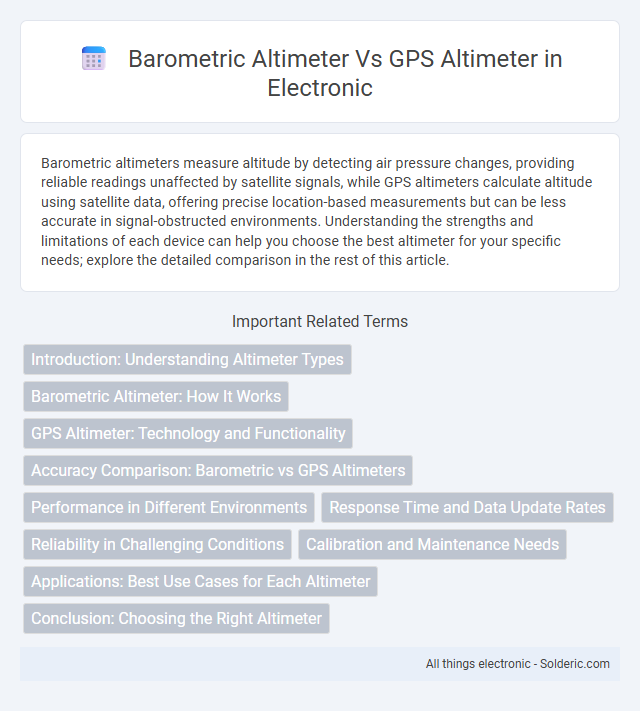Barometric altimeters measure altitude by detecting air pressure changes, providing reliable readings unaffected by satellite signals, while GPS altimeters calculate altitude using satellite data, offering precise location-based measurements but can be less accurate in signal-obstructed environments. Understanding the strengths and limitations of each device can help you choose the best altimeter for your specific needs; explore the detailed comparison in the rest of this article.
Comparison Table
| Feature | Barometric Altimeter | GPS Altimeter |
|---|---|---|
| Measurement Method | Atmospheric pressure changes | Satellite signal triangulation |
| Accuracy | +-5 to 20 meters (varies with weather) | +-3 to 10 meters (depends on satellite and signal) |
| Influence Factors | Weather conditions, pressure calibration | Satellite availability, signal obstruction |
| Update Rate | Continuous with rapid response | Typically 1 Hz or slower |
| Power Consumption | Low to moderate | Moderate to high |
| Usage | Aviation, hiking, skydiving | Navigation, mapping, aviation |
| Calibration Requirement | Frequent calibration needed | Generally no calibration required |
| Cost | Usually lower cost | Typically higher cost |
Introduction: Understanding Altimeter Types
Barometric altimeters measure altitude by detecting atmospheric pressure changes, providing accurate and reliable readings especially useful in aviation and hiking. GPS altimeters calculate altitude based on satellite signals and triangulation, offering global coverage but can be less precise in dense urban or forested areas. Your choice depends on the environment and precision needed, with barometric altimeters excelling in stable atmospheric conditions and GPS altimeters beneficial for broad, real-time positioning.
Barometric Altimeter: How It Works
A barometric altimeter measures altitude by detecting changes in atmospheric pressure, which decreases as elevation increases. This device uses a built-in aneroid barometer to convert air pressure readings into an altitude estimate, providing more consistent and immediate data than GPS altimeters. Your accuracy improves indoors or in areas with limited satellite signals, making barometric altimeters ideal for hiking or aviation when GPS signals are weak or unavailable.
GPS Altimeter: Technology and Functionality
GPS altimeters utilize satellite signals to calculate precise altitude by measuring the distance between the receiver and multiple GPS satellites, leveraging trilateration technology. This method allows for accurate altitude readings independent of atmospheric pressure, making GPS altimeters reliable in varied weather conditions and environments. Their functionality extends to real-time data processing, enabling seamless integration with navigation systems for applications in aviation, hiking, and outdoor sports.
Accuracy Comparison: Barometric vs GPS Altimeters
Barometric altimeters provide altitude measurements based on atmospheric pressure, often delivering higher accuracy in small vertical changes and consistent relative data for aviation and hiking. GPS altimeters rely on satellite signals to calculate elevation above sea level but can suffer from signal multipath errors and reduced precision in dense urban or forested areas. While barometric altimeters require calibration for pressure variations, GPS altimeters offer global altitude referencing, making them complementary tools depending on environmental conditions and use cases.
Performance in Different Environments
Barometric altimeters provide reliable altitude readings by measuring atmospheric pressure, performing well in stable weather conditions but may suffer inaccuracies during rapid weather changes or turbulence. GPS altimeters calculate altitude using satellite signals, offering consistent performance in open skies but often experience signal degradation or loss in urban canyons, dense forests, or mountainous terrain. Combining both altimeters enhances accuracy and reliability across a wide range of environments, optimizing altitude measurement for aviation and outdoor activities.
Response Time and Data Update Rates
Barometric altimeters provide rapid response times with continuous pressure sensing, enabling fast altitude updates typically every second or faster. GPS altimeters rely on satellite signal processing, resulting in slower response times and data update rates generally limited to 1 Hz, or once per second. The quicker response of barometric altimeters is advantageous for real-time altitude adjustments, while GPS altimeters offer precise absolute altitude data but with delayed updates.
Reliability in Challenging Conditions
Barometric altimeters provide more reliable altitude readings in challenging weather conditions like heavy cloud cover or dense fog because they measure atmospheric pressure rather than relying on satellite signals. GPS altimeters can experience signal degradation or loss in areas with tall buildings, dense forests, or deep valleys, limiting their accuracy. Your choice should consider barometric altimeters for consistent performance in adverse environments where GPS signals may be obstructed.
Calibration and Maintenance Needs
Barometric altimeters require regular calibration to adjust for atmospheric pressure changes, often needing manual updates before each use to ensure accuracy. GPS altimeters rely on satellite signals and generally require less frequent calibration but may need software updates and occasional integrity checks to maintain performance. Both systems demand periodic maintenance, with barometric models sensitive to environmental factors and GPS units dependent on signal quality and device firmware.
Applications: Best Use Cases for Each Altimeter
Barometric altimeters excel in aviation and hiking due to their accuracy in measuring relative altitude changes and independence from satellite signals. GPS altimeters are optimal for activities requiring precise absolute altitude measurements, such as geocaching and mapping, benefiting from global coverage and integration with navigational data. Combining both altimeters enhances reliability and accuracy in outdoor sports and advanced navigation systems.
Conclusion: Choosing the Right Altimeter
Selecting the right altimeter depends on accuracy needs and environmental factors; barometric altimeters excel in precision when calibrated but require regular adjustments due to pressure changes, while GPS altimeters provide consistent altitude readings unaffected by weather but may suffer from signal limitations and lower vertical accuracy. Climbers and pilots often prefer barometric altimeters for their reliability in altitude estimation under stable conditions, whereas hikers and outdoor enthusiasts benefit from GPS altimeters for ease of use and global coverage. Optimal altimeter choice balances the trade-offs between sensor type, environmental influence, and application-specific accuracy requirements.
barometric altimeter vs GPS altimeter Infographic

 solderic.com
solderic.com